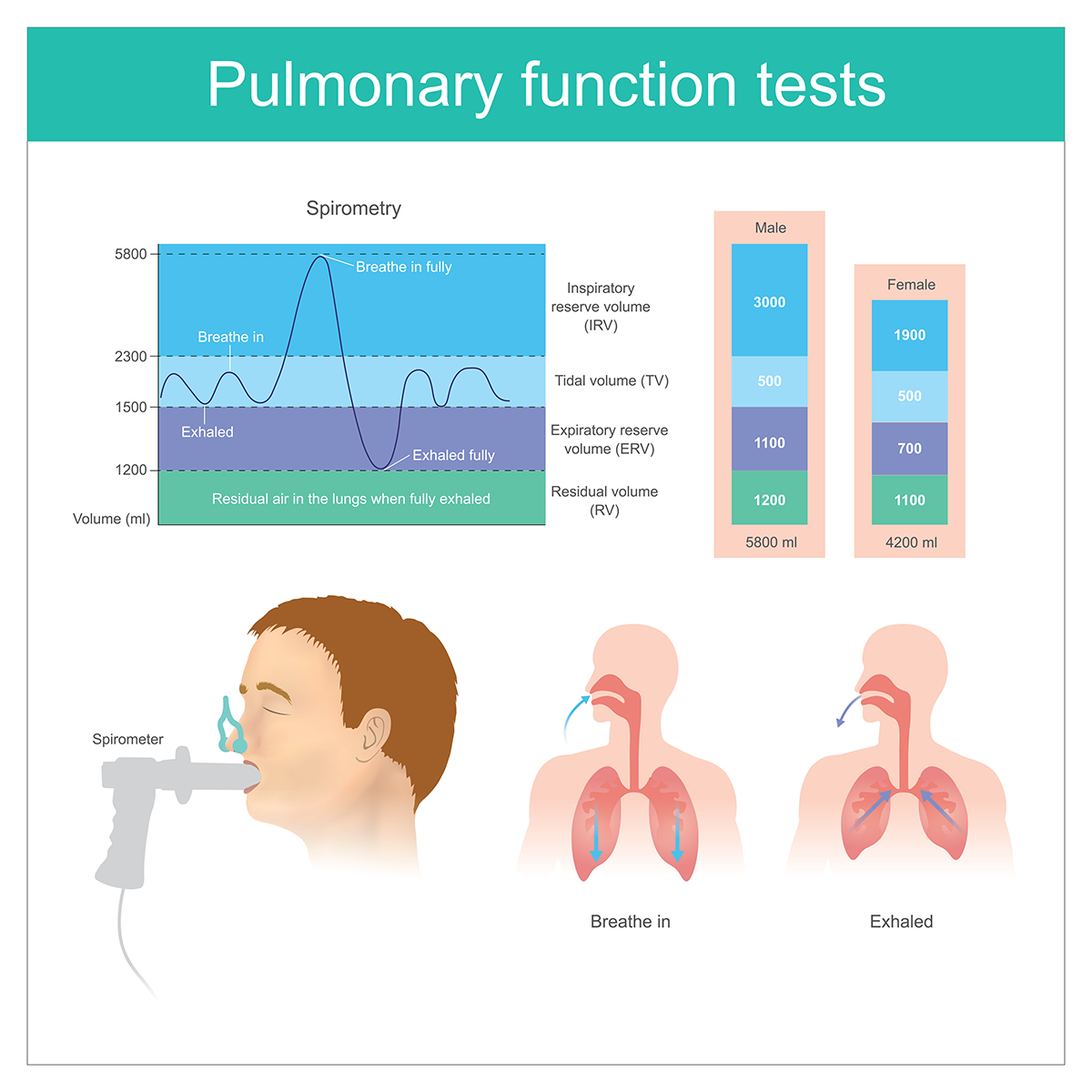Pulmonary function tests (PFT)
There are many different pulmonary function tests (PFTs) that assess how well your lungs work. Your Aurora doctor may recommend one or more lung function tests if you’ve had excessive coughing, trouble breathing or other symptoms that indicate you may have a lung condition.

Images show a sample graph of air volume during a common pulmonary function test, bar graphs of average air volume levels, and a spirometer inserted in a person’s mouth.
Types of pulmonary function tests
Spirometry testing is the most common PFT. It measures the volume of air moving in and out when you breathe, the speed of the air and how much effort it takes for you to breathe. You may have a spirometry test at your doctor’s office or at a separate testing facility.
Other common respiratory function tests are:
- Diffusing capacity: Measures how efficiently oxygen moves through your lungs to your blood.
- Exercise stress test: Measures functioning of your lungs and heart during exercise on a treadmill or stationary bike.
- Fractional exhaled nitric oxide: Measures amount of nitric oxide exhaled. Can help diagnose and manage asthma.
- Lung volume: Also called body plethysmography, this test measures how much air you can hold in your lungs and how much air remains after you exhale.
You may undergo blood tests, including an arterial blood gas (ABG) test that measures the amount of carbon dioxide and oxygen in your blood. Other pulmonary function tests you may receive are bronchoscopy and endobronchial ultrasound (EBUS). X-rays may also be ordered to provide a look at potential lung damage.
Your doctor will gain a full understanding of your lung health from the combination of your pulmonary function test results.
Contraindications for exercise stress tests
Your doctor won’t order an exercise stress test if you have any of the following conditions:
- Confusion
- Had a stroke or heart attack in the last three months
- Large aneurysm of a major blood vessel
- Recent eye surgery
- Serious head injury
Side effects from pulmonary function tests
Most PFTs have few side effects. You may feel dizzy or lightheaded. Some people feel a little claustrophobic.
Why do doctors order PFTs?
Doctors order lung function tests to diagnose or monitor your condition, or to check if ongoing treatment is working. They may also order pulmonary function testing if you have a lung or abdominal surgery planned to ensure your lungs are healthy enough for surgery.
In some cases, they’ll order tests to evaluate any lung damage because of exposure to chemicals on the job or in your home.
Conditions diagnosed with pulmonary function testing
Some of the conditions that may require lung function testing for diagnosis include:
- Abnormal lung X-rays
- Allergies
- Asthma
- Chronic obstructive pulmonary disease (COPD)
- Damaged or scarred lung tissue
- Infections
- Lung cancer
- Pulmonary fibrosis
- Sarcoidosis – damages cells around your lungs
- Scleroderma – thickening or hardening of the connective tissues
- Thickened, stretched or enlarged airways
Conditions may be described as either restrictive or obstructive. Restrictive conditions prevent your lungs from expanding normally – leading to not inhaling enough oxygen for your needs. Some restrictive conditions are:
- Pulmonary fibrosis
- Sarcoidosis
- Sclerederma
Obstructive conditions make the airways in your lungs too narrow because of inflammation or excess mucus production. Common obstructive conditions are:
- Asthma
- Bronchitis
- Emphysema
Get care
We help you live well. And we’re here for you in person and online.